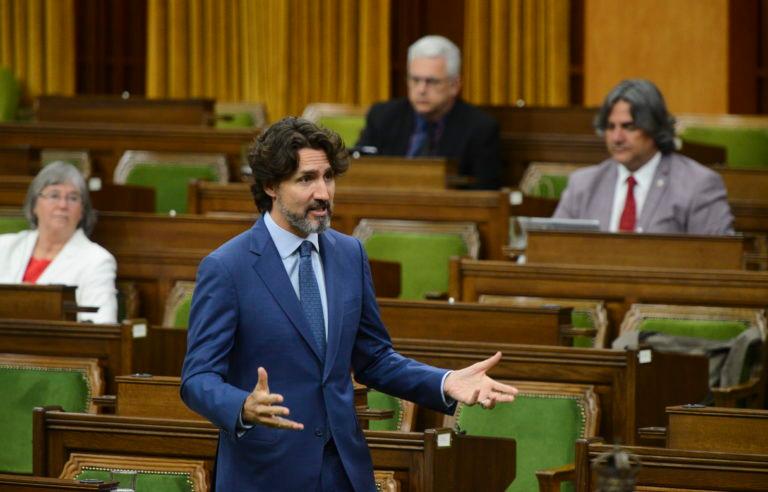The Liberals had no dance partners after all
Politics Insider for June 11: Parliament calls it a day after only a few minutes, Erin O’Toole releases a big platform and it’s been 155 days since the Flight 752 tragedy

Prime Minister Justin Trudeau speaks during the special committee on the COVID-19 pandemic in the House of Commons on Parliament Hill amid the COVID-19 pandemic in Ottawa on Wednesday, June 10, 2020. (Sean Kilpatrick/CP)
Share
Welcome to a sneak peek of the Maclean’s Politics Insider newsletter. Sign up to get it delivered straight to your inbox.
Anyone who follows Yaroslav Baran, a Harper-era comms wizard who prides himself on his “esoteric understanding” of parliamentary procedure, got the low-down—before it happened—on what went down yesterday in the House of Commons. Baran had stitched together some tweets that predicted exactly what would happen: the Liberals would table their latest emergency legislation, the opposition would withhold unanimous consent, and the House would quickly adjourn. And so it was. (He also played out a scenario in which the House would meet again as early as tomorrow, but that’s not in the offing.)
The Liberals needed everyone to agree to debate Bill C-17, which would expand the federal wage subsidy, extend the CERB and authorize payments to Canadians with disabilities. But no one played ball. The NDP opposed the bill’s provisions that would punish Canadians who improperly received the CERB (worth noting: 190,000 Canadians and counting have already repaid their CERB). The Conservatives were finished with emergency sittings with special rules. The Bloc Québécois had specific demands—a fiscal update this month, a federal-provincial meeting on health transfers and a ban on political parties receiving the wage subsidy—that went unmet.
Now, the House is adjourned until next Wednesday’s sitting. The Globe and Mail points out that since June 22 of last year, the Commons has sat a mere 38 days. And the Globe‘s John Ibbitson wrote a column that evokes the frustration of many parliamentary denizens, Liberals excepted, in this town: “The COVID-19 crisis has neutered Canada’s already weakened Parliament.”
June 17, the date of the next showdown in the Commons, is something of a political lollapalooza. It so happens to be the same day the UN will either elect Canada to the Security Council, or reject its bid for the second time in a decade. Tories will convene that night, mostly virtually, for their French-language leadership debate. And don’t forget Maclean’s Live, hosted by Paul Wells on a Zoom screen near you at 7 p.m. ET (stay tuned for details).
Greta Thunberg, a bee in Ottawa’s climate-action bonnet, has joined a crew of scientists in asking UN ambassadors from small island states to ask hard questions of Canada and Norway before next week’s Security Council vote. How can two nations powered by fossil fuels possibly be taken seriously on climate change? Regular readers will have noticed those same small islands, which risk sinking into rising oceans, are exactly who Trudeau has been courting for votes.
As Canada confronts a national debate on police reform, RCMP Commissioner Brenda Lucki is doing the rounds. She spoke to Global News about systemic racism on the force. “I have been struggling with the definition of systemic racism, and when I think of unconscious bias, there is unconscious bias in the RCMP, most definitely.” Lucki told the Globe that she’s “heard about five or 10 different definitions on TV.” She told The National she’s heard “15 or 20 definitions.” (If the commissioner wants a reliable definition, she need look no further than Sen. Murray Sinclair’s remarks in a 2018 parliamentary report. Scroll to page 19.)
Erin O’Toole upped the ante in the Tory leadership sweepstakes. O’Toole, who arguably bested rival Peter MacKay‘s plan to save Canada’s economy, yesterday published his full platform. Let’s start with the internal party stuff buried at the back. O’Toole says the Tory fundraising machine is falling behind the Liberals. Party members, he says, feel like their sole purpose is to be “squeezed by paid phone banks.” And the once-famed CIMS voter identification system, he argues, is “dated.” O’Toole wants to “buy world-leading technology” instead of building something from the ground up.
He’s got policy, too. He’d “fix equalization” that hurts Alberta, but doesn’t explain how he’d rework the complex equalization formula. He’d set up official checkpoints at the border where “irregular claimants attempting to cross the border illegally”—taking both sides in the “irregular” vs. “illegal” semantic debate on asylum-seekers. He’d slap Magnitsky sanctions on senior Chinese officials if they failed to release Michael Kovrig and Michael Spavor within 30 days of the new O’Toole era. And he’d pivot to India by relaunching free-trade talks that have gone nowhere under the Trudeau government. That’s just a taste of the 22-chapter vision.
155 days: That’s how long it’s been since Flight 752 was shot down by the Iranian military, killing 176 passengers and crew—including 57 Canadians. The Iranians still haven’t submitted the aircraft’s black boxes to another country’s lab for detailed data analysis. International rules say Iran should see to that analysis “without delay.” Yesterday, Transport Minister Marc Garneau joined an International Civil Aviation Organization virtual meeting to press for answers. Those pleas appear to be falling on deaf ears.
Mea culpa: In yesterday’s Politics Insider, your correspondent wrote that Marwan Tabbara, the MP for Kitchener South-Hespeler, Ont., represented the nearby riding of Guelph. In fact, two-term Liberal MP Lloyd Longfield represents the Royal City, a land of “Faith, Fidelity and Progress” with an evocative coat of arms and origin story stretching back 1,000 years. Tabbara’s alleged crimes occurred in Guelph.